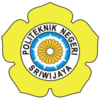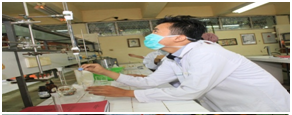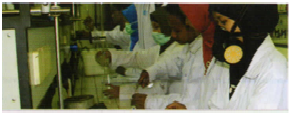Introduction
Chemical Engineering Study Program conducts vocational education which prepares students to be professional experts who are reliable, responsive to the development of processing technology, and able to apply their competences in the field of processing industry.
Chemical Engineering Study Program was esablished in 1987. It is one of study programs in Chemical Engineering Department based on the Minister of Education and Culture Letter No. 0313/O/1991 dated 06-06-1991. Since 2004 it has got level B accredition- Accreditation BANPT No. B. 002/BAN-PT/Ak-X/Dpl-III/V/2010 dated May 14, 2010.
To support the teaching and learning process, Chemical Engineering Study Program has classrooms which are equipped with facilities such as teaching aids, laboratories, library and other public facilities.
The curriculum of Chemical Engineering Study Program is a competency-based curriculum. It is based on the identification of market needs (stakeholders and Alumni). It consists of 57 subjects, 118 credits-68 credits for theory and 50 credits for practice. The teaching and learning process hour consists of 57 % practice and 43 % theory. The total number of lecturers in Chemical Engineering Department are 44 lecturers; S2 degree=36 lecturers; S2 degree (on going) =1 lecturer; S3 degree= 2 lecturers and S3 degree (on going) = 5 lecturers.
To improve the implementation of the Tri Dharma, Chemical Engineering Study Program conducts internship for students and faculty, recruitment, education, training and research. For poor but good learning achievement students, some scholarships both from government and private are available.
Vision
Toward a leading vocational education institution in the field of Processing Industry.
Mission
- Improving the process of teaching and learning for producing graduates who arequalifiedinthefield ofProcessing Industry under quality assurancesystem base;
- Developing, disseminating, andapplying science, technology and research resultsfor productive activity purposes andbetter quality ofpeople’s lives;
- Enhancingpartnership with other partiesthroughcommunity service activities-the developmentandapplication of scienceandtechnologyfor mutual benefit purposes.
Purpose
To produce graduates who are professionals in the field of processing industry, have high discipline, good morale, entrepreneurial spirit, environmentally sound, be adaptable to the development of the industry and can play a role in society.
Target
Produce graduates who are professionals in the field of processing industry and are able to operate and maintain processing industry equipment, specify the raw materials and products based on SOP, and implement safety systems.
Strategies to Achieve Targets
- Every freshman get an explanation about Polytechnic Education System to allow him/her to adjust and prepare for the teaching and learning activities and get ³15 GPA;
- Furthermore, for ensuring that the studentsget the transfer of knowledgesystematicallyandmaterials that correspond with the expected competencies,GBPP, lesson plans and teaching and learning contracts are controlled by cross checking logactivitiescompleted byeach lecturer;
- ForTeaching and Learning(PBM) processes, supporting facilities like the cleanandcomfortable rooms , teaching aidslikeLCD, Laptop/Computer, OHP, referencebooks, textbooks, modulesandpracticeguides are needed;
- The presence ofteachingstaffandstudentsin theclassroomat least90% of the total meeting;
- Enhancing the role ofAcademic Advisor (AA) in monitoring the students’ learning progressandmotivating studentsin order toimprovetheir learning achievement;
- In evaluating the result of the students’ learning, the role of areas of expertise coordinator (KBK) is badly needed. It is needed for ensuring the questions given on mid-semester test (MST) and semester test(ST) by faculty comply with the competencies of each course, and uniformity of MST and ST questions of a multi-lecturer course;
- Curriculum consists of theorycourses(maximum 45%) andpractices(minimum 55%).
Graduates’ Profile
- Supervisor;
- Entrepreneur.
Learning Outcomes
Core Competences
- Master the basic concepts of chemistry and process production, as well as its application in the field of processing industry, especially in the oil, gas and coal industry;
- Able to work in teamandpreparea comprehensivewritten report;
- Able tocomplete the workinprocessing industry, according to the existing SOP;
- Able to demonstratequalifiedandmeasurable
Supporting Competences
- Able to handle computerizedprocessingin Chemical Engineering;
- Able toassess theapplication of technology inthe field ofprocessing industry for public;
- Understand thesewage treatmentengineering, andfood processing technology;
- Have values of Polsri Motto: Punctual, precise and loyal.
Other Competences
- Able to communicateandwork in team;
- Have good leadership skill;
- Have an entrepreneurial spirit(entrepreneurship).
Graduates’ Competences
Professionals in the field of industrial process, able to operate and maintain industrial process equipment, capable of specifying the raw materials and products based on SOP, and capable of implementing safety systems at work.
Training Services
- Lab Management Training
- Training of HYSIS, Aspen and Mathlab Software application.
- K3 for Chemical-Training
- Analytic-Training (GC, AAS, HPLC) etc.
- Coal Analysis -Training (calorimeter, TGA, Truspect, Sulfur analyzer)-etc.
- Environmental Aspect Training
Production and Consultation Services
- Purified Water and Bottled Water
- Production of Bread
- Design of Process Equipment
- Environmental Audit-Consultation Service
- Process Audit-Consultation Service
Facilities
Laboratories and Workshops


